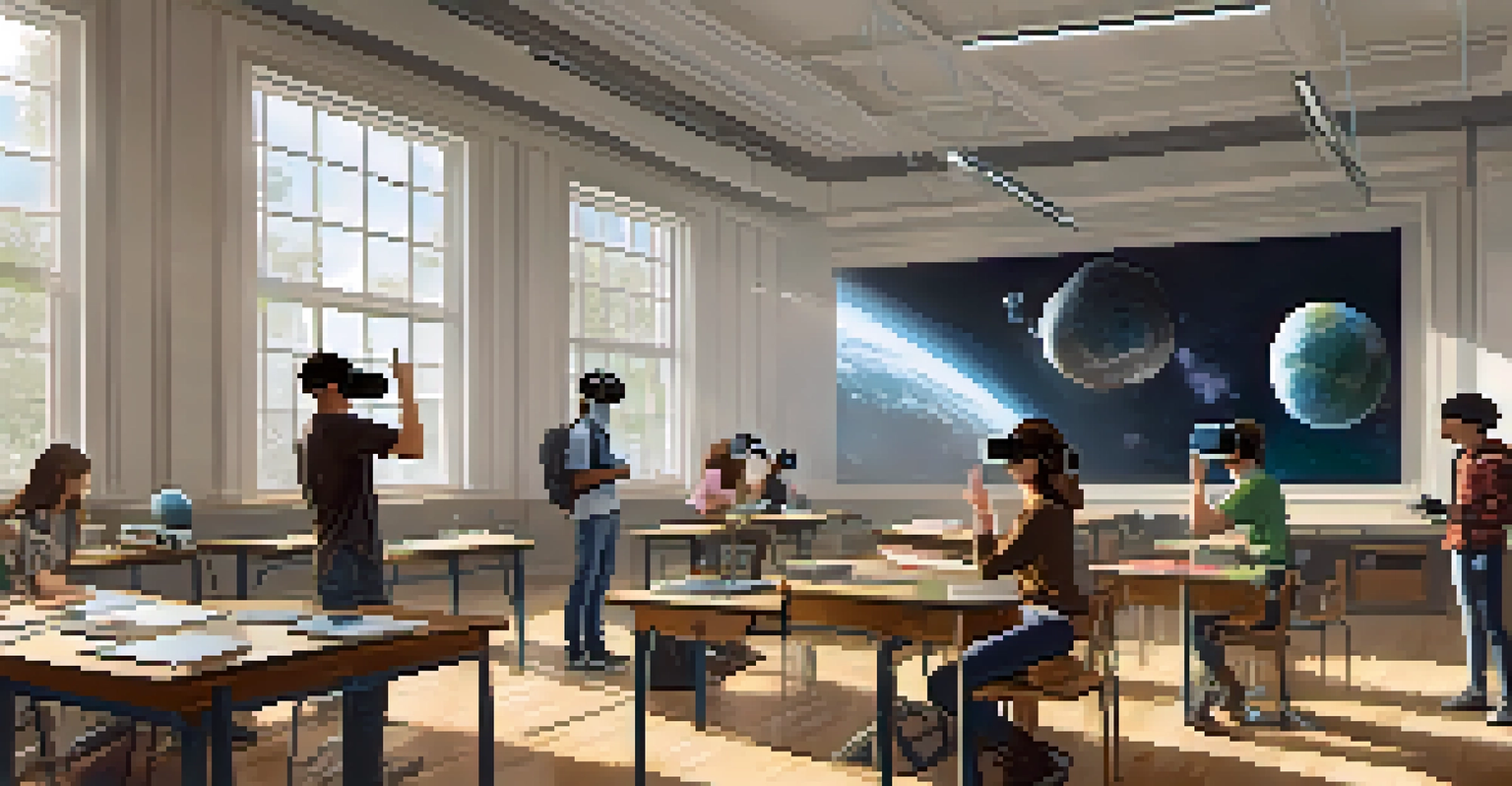Future of Higher Education: Research Trends in Pittsburgh

Pittsburgh's Educational Landscape: A Brief Overview
Pittsburgh has long been a hub for higher education, home to prestigious institutions like Carnegie Mellon University and the University of Pittsburgh. These schools have paved the way for innovative research and educational practices. With a blend of tradition and modernity, the city is uniquely positioned to embrace the future of education.
Education is the most powerful weapon which you can use to change the world.
In recent years, there has been a significant shift towards interdisciplinary studies, integrating technology and the arts into traditional curricula. This evolution is reflective of broader societal changes and the increasing demand for versatile skill sets. Students are now encouraged to think beyond their majors, fostering a culture of collaboration and creativity.
Moreover, Pittsburgh's commitment to education is bolstered by its vibrant tech scene, which plays a crucial role in shaping research trends. Local startups and tech companies actively partner with universities, creating a dynamic ecosystem that nurtures innovation and prepares students for the workforce.
Emerging Technologies in Higher Education Research
One of the most exciting trends in higher education research is the integration of emerging technologies, such as artificial intelligence and virtual reality. These technologies are not just buzzwords; they are transforming how students learn and engage with their subjects. For instance, virtual reality can bring history lessons to life, allowing students to experience events in an immersive way.

In Pittsburgh, universities are at the forefront of exploring these technologies, conducting research that aims to enhance the educational experience. AI is being used to personalize learning, tailoring educational content to meet the needs of individual students. This approach not only improves engagement but also helps bridge gaps in understanding.
Interdisciplinary Education Gains Traction
Pittsburgh's universities are fostering interdisciplinary research, promoting collaboration across various fields to tackle complex societal issues.
As these technologies continue to evolve, they offer new opportunities for research and collaboration. Educational institutions in Pittsburgh are actively seeking ways to leverage these advancements to create innovative learning environments, ensuring that their students are well-equipped for the future.
The Rise of Online Learning and Hybrid Models
The COVID-19 pandemic accelerated the adoption of online learning, a trend that shows no signs of slowing down. Higher education institutions in Pittsburgh are now embracing hybrid models that combine traditional in-person classes with online components. This flexibility accommodates diverse learning styles and schedules, making education more accessible to all.
The beautiful thing about learning is that no one can take it away from you.
Research into effective online teaching strategies has become a priority, with educators exploring how to engage students in virtual settings. This includes the use of interactive tools and collaborative projects that replicate the classroom experience. Institutions are learning that a blended approach can enhance learning outcomes and student satisfaction.
As more students seek online options, Pittsburgh's universities are innovating to remain competitive. They are investing in technology and training faculty to deliver high-quality online education, ensuring that they can meet the evolving needs of the modern learner.
Interdisciplinary Research: Breaking Down Silos
Interdisciplinary research is gaining traction in Pittsburgh's higher education landscape, encouraging collaboration across different fields of study. This approach fosters a more holistic understanding of complex issues, such as climate change, public health, and social justice. By bringing together diverse perspectives, students and researchers can develop innovative solutions.
For example, a project combining engineering, environmental science, and policy studies can lead to more effective sustainability initiatives. Pittsburgh’s universities are actively promoting these collaborative efforts, recognizing that real-world problems require multifaceted solutions. This trend not only enriches research but also prepares students for teamwork in their future careers.
Emphasis on Community Engagement
Higher education institutions in Pittsburgh are increasingly focusing on community engagement to ensure their research has a direct social impact.
As the boundaries between disciplines continue to blur, Pittsburgh is establishing itself as a leader in interdisciplinary education. This shift not only enhances academic research but also cultivates a workforce adept at navigating the complexities of various sectors.
Community Engagement and Social Impact Research
Pittsburgh's universities are increasingly focused on community engagement, recognizing the importance of research that has a direct social impact. This trend reflects a growing awareness of the role that higher education plays in addressing local issues. By partnering with community organizations, universities can ensure that their research is relevant and beneficial.
Research initiatives often involve students working directly with community members, providing valuable hands-on experience while addressing pressing challenges. For instance, projects aimed at improving public health or education in underserved neighborhoods not only contribute to academic knowledge but also foster civic responsibility among students.
This commitment to community engagement enhances the educational experience and builds stronger ties between universities and the city. As Pittsburgh continues to evolve, this focus on social impact will be crucial in shaping the future of higher education.
The Importance of Lifelong Learning in Modern Education
As the job market continues to change rapidly, the concept of lifelong learning is becoming increasingly important. In Pittsburgh, higher education institutions are adapting to this trend by offering programs that cater to adult learners and professionals seeking to upskill. This flexibility allows individuals to pursue education at any stage of their career.
Many universities now provide non-degree programs, workshops, and online courses that empower learners to stay relevant in their fields. This approach recognizes that education doesn't end after graduation; rather, it is a continuous journey. By embracing lifelong learning, institutions can help individuals navigate career transitions and pursue new opportunities.
Lifelong Learning Becomes Essential
As the job market evolves, Pittsburgh's colleges are adapting by offering flexible programs for adult learners, emphasizing the importance of lifelong education.
Pittsburgh is leading the way in promoting a culture of lifelong learning, ensuring that education remains accessible and relevant. This commitment not only benefits individuals but also strengthens the local economy by fostering a skilled and adaptable workforce.
Future Challenges and Opportunities in Higher Education
While the future of higher education in Pittsburgh looks promising, it is not without its challenges. Issues such as rising tuition costs, student debt, and accessibility remain at the forefront of discussions. Addressing these concerns will require innovative solutions and a collaborative effort between institutions, government, and communities.
At the same time, the evolving landscape of technology and society presents numerous opportunities for growth and improvement. Institutions that embrace change and invest in research will be well-positioned to thrive. By prioritizing inclusivity and adaptability, Pittsburgh's universities can ensure that they meet the needs of all learners.

Ultimately, the future of higher education in Pittsburgh is a collective journey. By addressing challenges and seizing opportunities, the city can cultivate an educational environment that prepares students for success in an ever-changing world.